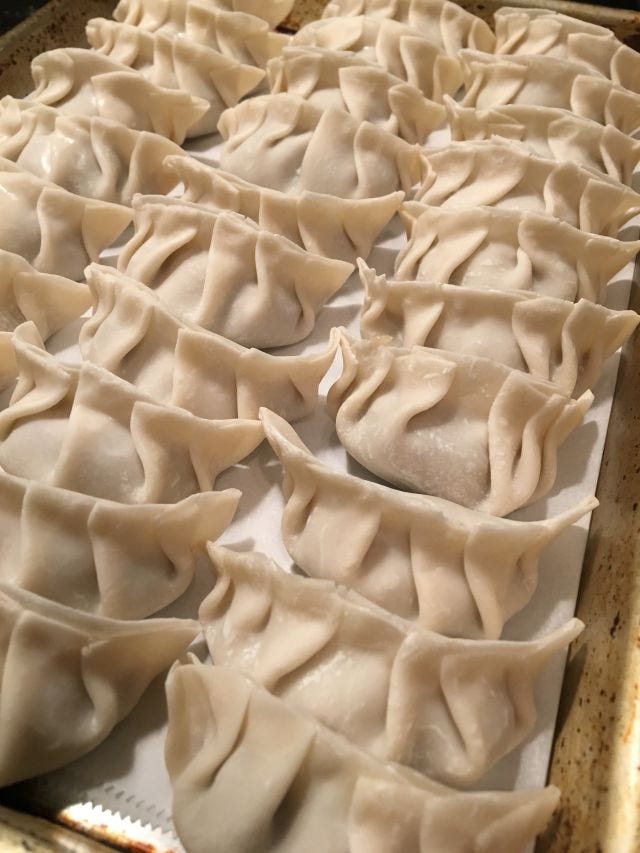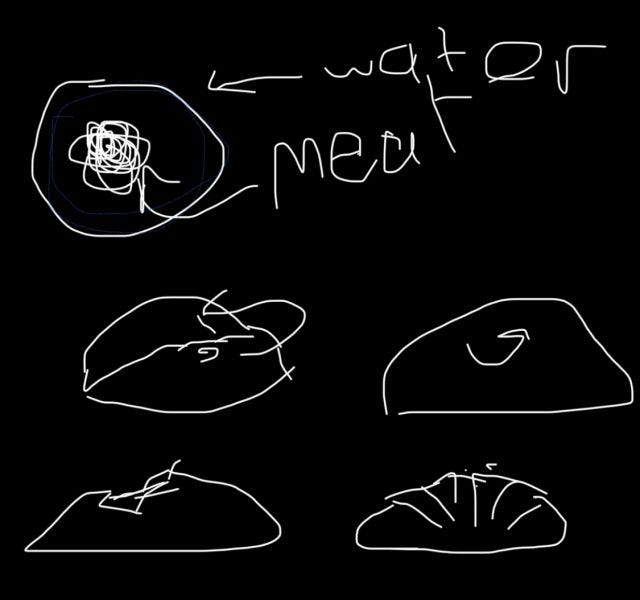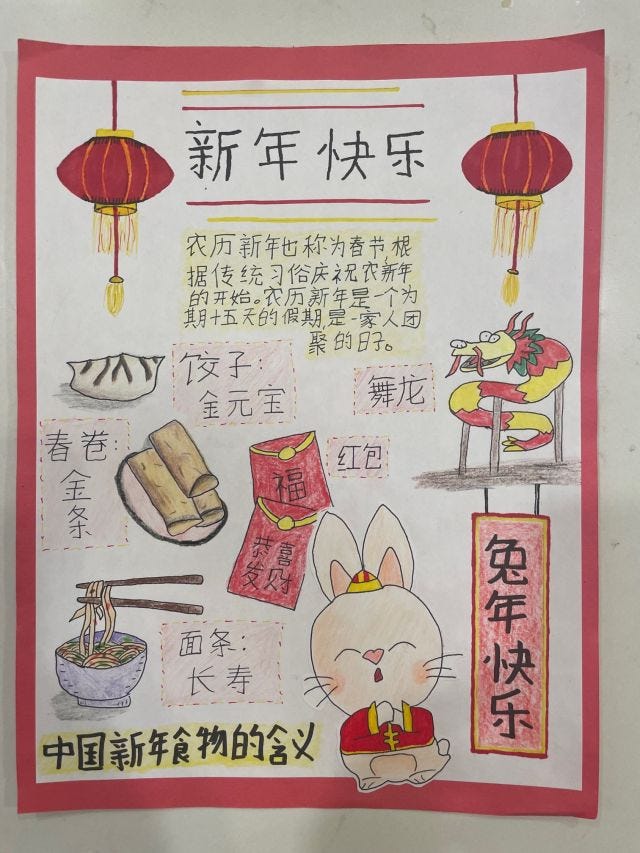How to Wrap Dumplings or Trying to Teach My Kids About Chinese Culture
Hi friends,
A quick housekeeping note: The newsletter is moving! The next issue will come from Substack. If you're subscribed, you don't have to do anything and shouldn't notice a difference (except that it may show up in your spam folder or under your promotions tab).
*********
I wrapped dumplings on Lunar New Year’s Eve. A lot of them. There’s something satisfying about wrapping dumplings, meditative almost. You get into this rhythm of wrapper, filling, dab some water, fold and pinch. Repeat. For three hours, it was just me transforming four pounds of filling into little packages.
Halfway through, my older son sat down to help. Without a word, he fell into a rhythm with me. Sometimes he passed me a dumpling that wouldn’t quite stay together. Then, he started wrapping egg rolls. They're considered lucky food for the new year since they look like gold bars when they're cooked, symbolizing wealth and prosperity.
I couldn’t remember when or how he learned to wrap egg rolls. Definitely not from me. My mom usually has to remind me how to wrap them because I can never remember. But as I watched him, he moved effortlessly, like this was just a normal Saturday afternoon.
I’ve always worried about my kids’ connection to the Chinese side of their identity.
Will they understand all the idiosyncratic things about Chinese families? Will they understand the Chinese phrases that I can’t quite translate into English? Will they know how to cook Chinese food? Will they know the culture? Or will a part of my family—our history, family recipes, language—wither away with their generation because the roots to their past are getting weaker?
When my kids were young, I wanted them to grow up in an environment like I did, rich with the sounds of Chinese, the clacking of mahjong tiles, the smell of braised and roasted meats, the thrill of red envelopes and fire crackers on Lunar New Year. It felt important that they know and understand where they come from, where I come from. I spoke to them in Cantonese. I cooked Chinese food. I read them books about Chinese traditions.
Pretty quickly, it became clear that it wasn’t going to be enough. I couldn’t replicate the rich traditions that colored my childhood home because I didn’t actually know the history behind them. While I spoke Chinese growing up, it was the mix of broken Chinese and English that’s unique to first generation kids. My conversations with my mom largely revolved around me telling her that my brother and sister were teasing me or talking about food. I never learned to discuss more complex topics, which meant that my speaking ability rivals that of a five year old.
There wasn’t much to pass along.
When I was in elementary school, my mom suggested that I attend Chinese school. Of course, I refused. I already knew how to speak Chinese. Why did I need to go to Chinese school? After spending a few summers with family in Hong Kong, I found a fluency and ease to conversing in the language. I didn’t have to think about it, the words or the pronunciation. Whenever we’d see relatives or visit Chinatown, people would be surprised by my spoken Chinese, not in a judgmental way. Just surprised. (I’m not sure if there’s actually a difference between the two.)
I assumed that those language skills would stick, that I would be able to call upon them whenever I needed. But as got older and moved away from home, Chinese became less a part of my daily life. I didn’t realize that those connections were something that I needed to nurture. Now, I fumble over words. My tones are all wrong. My mom still corrects me, slowly repeating the correct words in the correct order and with the correct intonation.
Over Christmas, we had dinner in Chinatown with my sister and her family and several of our aunts and cousins. For the first time, the "kids" were in charge of ordering for ourselves. We all looked at each other blankly. We were all in our 40s and yet we couldn’t order for ourselves. (We eventually muddled our way through.)
In the past, an experience like this would have sent me into a spiral of embarrassment and disappointment. I’d vow to do better—Learn Chinese properly! Cook more Chinese food!—because I’m nothing if not a Chinese daughter who lives in fear of disappointing her mom. Despite wanting to retain a connection to my heritage and my family, those efforts would last a week or two at best. Most of the time, they would remain unchecked items on my to do list.
I just didn’t know how to do it in a way that fit my life and identity now.
{My son's Chinese homework}
A couple of years ago, my older son started asking my mom to teach him how to cook Chinese food. I gave him a list of food he should learn to make, a list of my all-time favorites. This way, at least some of our family recipes would be safeguarded for the future (and he could cook them for me). He chose to learn Mandarin in high school. It’s a pleasant surprise when he can pick up on some of my conventions with my mom, even when we’re speaking in Cantonese.
My connection to my culture looks different from my Mom’s and my kids’ and that relationship can shift and change over time. Just because I wasn’t able to replicate my childhood environment, which I thought was the recipe for connecting to the Chinese part of their identity, doesn’t mean that they won’t find their way to it later on.
It’s made me realize that sometime things take root if you give it some room to breathe, when you don’t hold on too tightly or ascribe all your hopes and dreams to one thing.
*********
What I'm Reading:
I hadn't heard of this concept of feminist science but it's an attempt to course-correct the gender bias baked into a lot of scientific research.
"In reality, feminist science offers a powerful set of tools for examining the history, context, and power structures in which scientific questions are asked. By bringing marginalized perspectives to the table, it can generate new questions and methodologies that help scientists identify and correct for hidden bias. Think of it as a stake strapped to a growing tree: it provides scaffolding to help the tree get back on track when it starts to lean too far to one side."
There’s been a lot of talk about this article from The Cut about the Fleishman moms, the women that see themselves reflected in Fleishman is in Trouble, the series on FX based on the book by Taffy Brodesser-Akner. And there’s a lot to discuss about the midlife angst, a very particular NYC-angst, that the article captures but it’s this response that really struck me:
“Here’s how it works: When your basic material needs are met, and the layer of desires right on top of that, and the one on top of that; when you have successfully attained not only everything you need but most things you want, a vacuum opens up inside you. And sure, you always expected it it to. But what you don’t expect is that, instead of that vacuum being filled by joy or fulfillment or satisfaction or whatever, it’s filled by any or all of the following: the desire for new things or a meandering anxiety caused by all the energy that used to be devoted to the pursuit of the thing you have, that your body simply doesn’t know how to turn off and might never be able to turn off; a constant flow of energy that, without the act of striving to burn through, might just set you on fire instead, leaving you terrified, empty, and on fire because all you’ve trained your body to do is voraciously pursue a comfortable life but never how to actually experience comfort within it.”
Lastly, this essay from Virginia Sole-Smith kind of blew my mind.
Thanks for reading.
Christine
PS: Up to Speed: The Groundbreaking Science of Women Athletes comes out on May 16, 2023 from Riverhead Books! It's available for pre-order now!
PPS: You can find an archive of previous newsletters here. You can subscribe to the newsletter here.






